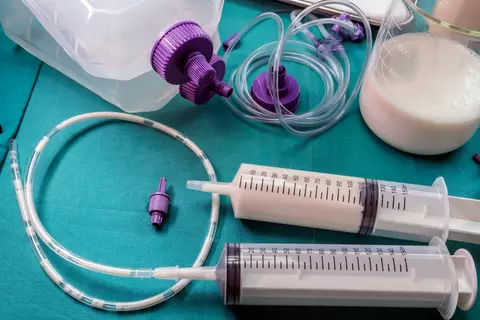Exclusive enteral nutrition (EEN) is associated with better long-term outcomes than corticosteroid therapy in children with Morbus Crohn
Plotkin L et al, Aliment Pharmacol Ther. 2024;60(2):224–32
In this nationwide cohort study from Israel, EEN was associated with lower risks of steroid-dependency and hospitalisations than corticosteroids.
Background: Both corticosteroids and exclusive enteral nutrition (EEN) have been used as induction therapy in children with Crohn's disease (CD).
Aim: To compare in a nationwide study the long-term outcomes of children with CD receiving either EEN or corticosteroids as induction therapy.

Methods: The authors retrieved data of all children diagnosed with CD (2005–2020) from the Israeli Inflammatory Bowel Disease (IBD) Research Nucleus (epi-IIRN) cohort covering 98% of the Israeli population. The primary outcome was time to complicated disease course (i.e., surgery, steroid dependency, or at least 2 classes of biologics). Patients were matched individually utilising propensity score adjustments.
Results: 410 children treated with EEN and 375 treated with corticosteroids without other treatments (median follow-up, 4.73 [interquartile range, 2.2–7.2] years [1433 patient-years]) were included. For 274 matched children, the probability of a complicated course was higher with corticosteroids than with EEN at 0.5, 3 and 5 years (14% vs. 4%, 42% vs. 27%, and 54% vs. 41%, respectively, p = 0.0066), despite similar use of biologics. Steroid dependency (10% vs. 2%, 15% vs. 3%, and 20% vs. 5%, respectively, p = 0.00018), and hospitalisations (20% vs. 11%, 37% vs. 26%, and 55% vs. 38%, respectively, p = 0.002) were higher with corticosteroids. During follow-up, children receiving corticosteroids as induction treatment were more often further exposed to corticosteroids, and those on EEN were more often further exposed to nutritional treatment (p < 0.001). Induction with EEN had no advantage over corticosteroids regarding survival probability of surgeries, biologic use and growth.
Conclusions: Exclusive enteral nutrition in paediatric Crohn’s disease (CD) is associated with lower long-term risks of corticosteroid dependency and hospitalisation than corticosteroids. These results may lend support to favouring nutritional therapy in paediatric CD.
DOI: 10.1111/apt.18028